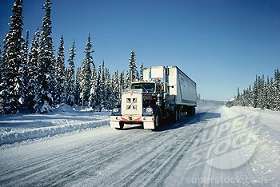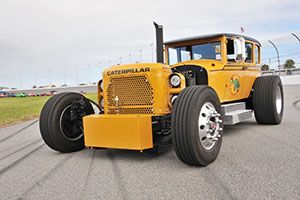Questions If Anyone Knows About It
Topic 19288 | Page 1

I have owned 2 trucks in the past and I am getting ready to buy my third one soon and no way I would do it for a nickel more. You have to pay 8 percent more in taxes and a blown steer tire on the side of the road is 1000 bucks.
I understand that a lot of LP fails due to what ever reason, however if I am smart about it, could it be more lucrative than being a company driver?
Jason, this is a subject that we try to avoid in here. Our purpose is to help new entrants into trucking navigate their way into a successful career. Trying to lease a truck is never considered a part of a good plan toward that goal in our opinion.
Think about the way you are thinking about this...
You know that a lot of people who lease trucks fail, but you're thinking if you are just smart about it you could make it work!
Don't you think everyone else thought the same thing?
The lease programs are set up to benefit the company, not the driver. This is an asset based business. The number crunchers in the offices found one more way to utilize their assets to make money. Hey, we can lease these things to unsuspecting drivers, and squeeze a little more out of them.
Lease Purchase contracts are called "Never - Never" contracts. You are Never going to own the truck and your never going to get ahead. Understand that Prime, Swift, Schneider, etc... do not want to actually sell you the truck. The whole point is to minimize their risk and cost. They pass on their truck payment to you, let you take care of paying for maintenance, fuel, etc... in exchange they turn your truck up to run a little faster and they throw in a portion of their average operating cost of a truck to you. Remember it is a portion of AVERAGE operating cost. That being said Lady Luck may smile at you or just straight up kick you in the junk. You may make a bit more than a company driver if your truck remains reliable and you get good at conserving fuel. Or you can lose your shirt by running it wide open with a truck that seems to have a million gremlins.
Basically you assume all the risk, while the parent company gets paid. It is a game and the odds are stacked against you. It is a bad faro game played with a crooked dealer.
Drive Safe and Godspeed.
This thread reminds me of that Dart guy who machine-gunned complained about BBQ sauce and electrical outlets.
He was legend. Thank you sir for the nostalgia of one of the funniest rants in the history of TT!

Accountant here. Never try to lease a tractor from your employer. They know how to structure the deal so that it's a good deal for them and a bad deal for you.
If you really, really want to be an owner, have $150k handy to buy a new truck and enough available credit to cover a couple of $10k unplanned expenses, then buy a new tractor. Alternately, if you can handle a $60k purchase and $40k of unplanned expenses over the next year, that can work too. But, either way, you better be seeing $0.30 per mile of additional revenue to compensate you for depreciation, maintenance and repairs, on top of the costs for fuel, registration, insurance...
Another factor to consider: Some people are easy on machinery, some are hard on it. If stuff you're operating tends to last longer than stuff that other people operate, your costs will be lower than average. If you're hard on the equipment, you'll never make money owning it.
If you really, really want to be an owner, have $150k handy to buy a new truck and enough available credit to cover a couple of $10k unplanned expenses, then buy a new tractor. Alternately, if you can handle a $60k purchase and $40k of unplanned expenses over the next year, that can work too. But, either way, you better be seeing $0.30 per mile of additional revenue to compensate you for depreciation, maintenance and repairs, on top of the costs for fuel, registration, insurance...
I wasn't going to approve this comment but I decided it's another chance to dispel one of the most common mistakes people make when starting a business. I don't know where this idea comes from, but everyone has it in their head that if they pay cash to start a business and avoid debt they'll be better off.
Nothing could be further from the truth. It's a terrible strategy.
A business needs cash, above all else, to fund ongoing operations. The idea that you're going to exhaust your cash reserves trying to get the business off the ground and then somehow miraculously find the cash to endure the inevitable hardships is really poor planning.
In fact, a terrifying percentage of small businesses that fail were actually profitable at the time they closed their doors but they simply didn't have the cash to continue funding operations. I went to a small business seminar one time and I'll never forget the gentleman saying, "Cash is king. When you're out of cash, you're out of business. So hang onto your cash, borrow money if you need to in order to start the business and fund operations."
Also, we have all-time record low interest rates today. There has never been a better time to borrow money.
According to an article on Small Business Trends:
82 percent of businesses that fail do so because of cash flow problems
Cash is the lifeblood of any business. Hang onto it.

Yes, small businesses fail every day because of cash flow problems. I prescribed one way of avoiding those problems, and the forum owner took issue with that.
We're both trying to steer people away from the same problem, just with different approaches.
Brett's suggestion is to sit on a pile of cash to cover the tight financial times and cover the fixed costs with financing.
My suggestion is to pay cash for the equipment and sit on a pile of credit lines to cover the tight financial times.
Both approaches are viable, but I have specific reasons for making the recommendation that I did. First and foremost, profit margins in the industry are tight these days, and $10-15k a year in interest expense on a new rig is not to be taken lightly. Secondly, the truck drivers I know are not the people who can obtain financing on favorable terms. Just because Brett can borrow money at 7% on a new truck does not mean the truckers who are at risk for cash flow failures are going to be able to finance a new truck for 7%.
HOS:
Hours Of Service
HOS refers to the logbook hours of service regulations.Just because Brett can borrow money at 7% on a new truck does not mean the truckers who are at risk for cash flow failures are going to be able to finance a new truck for 7%.
Just curious if these drivers "you know," who are not good credit risks, also happen to have piles of cash just laying around begging to be spent?
$10-15k a year in interest expense on a new rig is not to be taken lightly
Wow! What are the financing terms you're looking at?
According to the Commercial Truck Financing Calculator, financing $90,000 over 6 years at 6% would give you average yearly interest payments of a little over $3,000.
Secondly, the truck drivers I know are not the people who can obtain financing on favorable terms
They can't get decent credit terms, and yet they can manage to save $60k - $100k in cash to buy a new tractor outright? How does that happen?
New Reply:
New! Check out our help videos for a better understanding of our forum features

















Preview:








 TT On Facebook
TT On Facebook
I drove OTR for 2 years got a really nice paying local job. I was injured herniated a disc in my neck, had acdf surgery, I was cleared to go back to work and then was told my position was filled, so no more job. I have applied at a few companies and I was wondering about Dart LP program. It all sounds nice, but info about the real deal would be great.
I understand that a lot of LP fails due to what ever reason, however if I am smart about it, could it be more lucrative than being a company driver? I am thinking that if I can pull in a nickel more as a LP and if I get more I can put the money in the bank for a rainy day. I am very frugal as I had to learn to be living and supporting my family off 2/3 pay. Is it worth renting a truck to shoot for a nickel more per mi?
My PSP is spotless and so is my MVR. So there is no lack in work opportunities. Just the local stuff available right now doesn't pay well in Iowa
OTR:
Over The Road
OTR driving normally means you'll be hauling freight to various customers throughout your company's hauling region. It often entails being gone from home for two to three weeks at a time.
MVR:
Motor Vehicle Record
An MVR is a report of your driving history, as reported from your state Department of Motor Vehicles. Information on this report may include Drivers License information, point history, violations, convictions, and license status on your driving record.